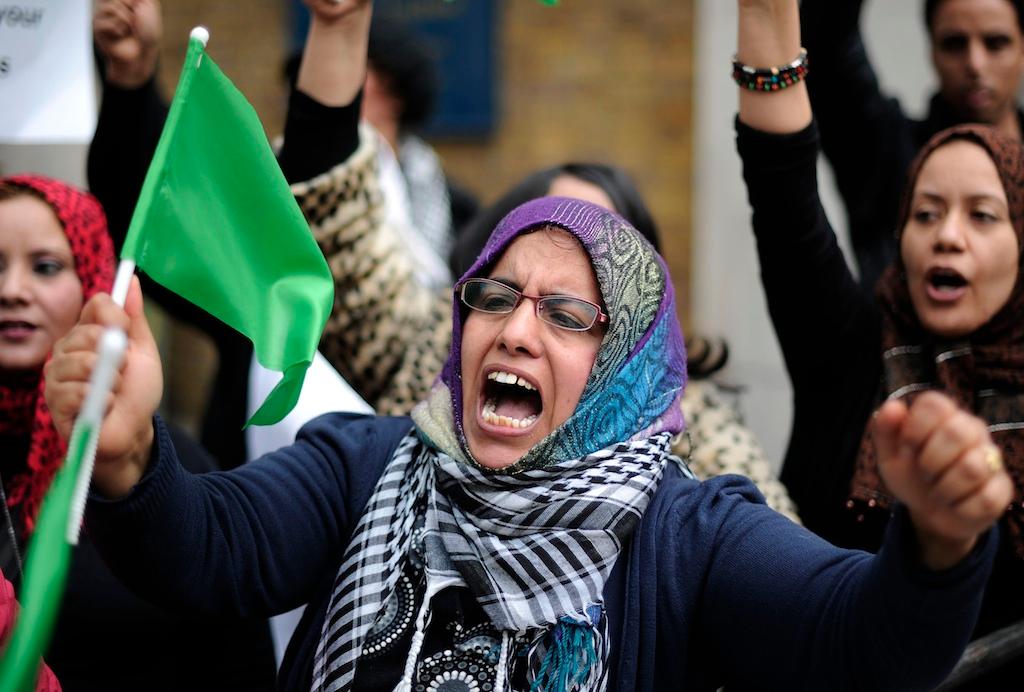Obama considers arming Libyan rebels (UPDATES) (VIDEO)
A woman takes part in a pro-Gaddafi demonstration in London on March 29, 2011.
The United States and Britain have said they are willing to consider arming Libyan rebels if Muammar Gaddafi continues to cling to power in the face of an opposition military campaign backed by international air strikes.
U.S. President Barack Obama said a negotiated settlement to end the conflict is still on the table if Gaddafi was to stand down, but supplying weapons to anti-government fighters could be an alternative route.
"I think it's fair to say that if we wanted to get weapons into Libya, we probably could," Obama told ABC. "We're looking at all our options at this point."
UK prime minister, David Cameron, echoed his comments saying that arming the rebels was a legal extension of the U.N.-mandated action in Libya and would not violate an arms embargo.
"Our view is that this would not necessarily rule out the provision of assistance to those protecting civilians in certain circumstances," he told Britain's parliament. "So … we do not rule it out but we have not taken the decision to do so."
Gaddafi's forces continued to claw back territory captured by rebels on Wednesday as gains made under cover of western air strikes were lost to the firepower of the government troops.
Troops loyal to Gaddafi retook Brega, forcing rebel fighters into a chaotic retreat to Benghazi under heavy bombardment, according to the Guardian.
Rebel fighters were forced to pull out of the oil town of Ras Lanuf, Reuters said. A euphoric westward advance begun by the rebels after government troops were driven by air strikes from the gateway town of Ajdabiya now appeared to be in disarray.
"Gaddafi hit us with huge rockets. He has entered Ras Lanuf," rebel fighter Faraj Muftah told Reuters
On Tuesday, forces loyal to the government retook the town of Nawfaliyah, 75 miles east of Gaddafi's hometown Sirt, ambushing the rebels and forcing them into a panicked retreat eastwards.
With no end in sight to the conflict, a group of 40 governments and international bodies met in London on Tuesday to discuss options for Libya.
The group agreed to continue the airstrikes against Libyan forces until Gaddafi complied with a U.N. resolution to end attacks on civilians and to set up a "contact group" of nations to coordinate help for a post-Gaddafi Libya.
U.S. Secretary of State Hillary Clinton emphasized in London that the U.N. ban on providing arms to Libya no longer applies, and the United States would be legally able to supply arms to the opposition if it so chooses, it states.
"It is our interpretation that [UN Security Council resolution] 1973 amended or overrode the absolute prohibition on arms to anyone in Libya," she said.
Some in the Obama administration, however, are concerned that the arms could deepen America's involvement in a civil war in Africa, the New York Times states.
There are also concerns that some rebel fighters may have links to Al Qaeda and Hezbollah.
“Al Qaeda in that part of the country is obviously an issue,” a senior official told the Times.
After six weeks of fighting, the crisis in Libya has left several thousand dead and thousands wounded, BBC reports.
Read more from GlobalPost about the crisis in Libya:
Rebels struggle against Gaddafi's firepower
Gaddafi calls on allies to halt airstrikes as his forces bomb Misurata (VIDEO)
— Hanna Ingber Win, Barry Neild
Every day, reporters and producers at The World are hard at work bringing you human-centered news from across the globe. But we can’t do it without you. We need your support to ensure we can continue this work for another year.
Make a gift today, and you’ll help us unlock a matching gift of $67,000!
